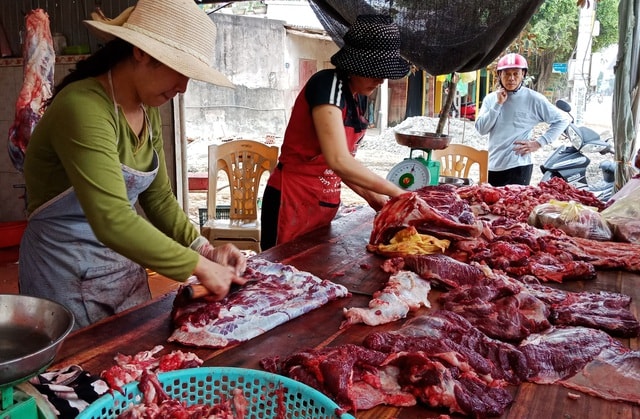Lumpy skin disease is not contagious to humans.
Lumpy skin disease in cattle is not transmitted to humans. Therefore, people can feel secure using buffalo and beef with guaranteed origin and quarantine.
Taboo and fear
At first, when pork prices skyrocketed, consumers in Ha Tinh switched to eating beef, chicken, fish... However, about a month ago, after the lumpy skin disease (LSD) outbreak in buffalo and cows broke out widely, many consumers in Ha Tinh and Nghe An turned their backs on buffalo and beef because they were afraid of buying products infected with LSD.
Currently, many restaurants, eateries, and consumers have a taboo mentality, are afraid, and even remove buffalo and beef products from their daily meals.
Ms. Nguyen Thi N., in Thach Ha town, Thach Ha district, shared that her family has 4 adults and 2 children. Everyone loves beef, so she usually buys 1-2 kg at each market, which lasts 2-3 days.
 |
| Beef market is slower than before. Photo: internet |
“I recently saw on TV that the disease was breaking out in many places, with cows having lumps on their skin. It was so scary, so I told my whole family to abstain from beef for a while. When the disease is under control, we can eat it again,” said Ms. N.
Sharing the same sentiment, another consumer named Huyen, in Ha Tinh City, expressed that in fact she did not know whether the VDNC disease in buffaloes and cows could be transmitted to humans or not, but to ensure the health of her whole family, for the past 2 weeks she has removed beef from her daily meals.
According to Ms. Huyen, before, there was always beef in the family refrigerator. Every two days, the whole family ate beef once, sometimes cooked in sour soup, sometimes stir-fried with onions and broccoli, sometimes braised in a sweet and salty sauce...
The decrease in purchasing power has made the atmosphere at the beef stalls at Vuon Uom market in Ha Tinh city gloomy. Ms. Nguyen Thi Hang, owner of the largest beef stall in the market, said that the cows slaughtered are all healthy and have passed quarantine at local slaughterhouses. However, due to psychological reasons, many people still turn their backs on beef.
“Before the VDNC epidemic, my stall sold 60 to 70 kg of beef every day. However, in the past month, the amount of meat sold has decreased significantly, sometimes only 10 kg of beef is sold per day,” Ms. Hang sighed.
Similar to Vuon Uom market, at some markets in the area such as Ha Tinh provincial market; Cay market, Muong market (Thach Ha district)..., sluggish beef sales are a common situation at buffalo and beef stalls, many traders have even had to stop selling.
Lumpy skin disease is not contagious to humans.
The outbreak of African swine fever in cattle and buffaloes has spread widely not only in Ha Tinh and Nghe An but also in many provinces and cities across the country. Recently, the press and media in Ha Tinh have reported extensively with the aim of warning livestock farmers to raise awareness in disease prevention and control for livestock, limiting economic losses.
According to Mr. Tran Hung, Head of the Department of Animal Husbandry and Veterinary Medicine of Ha Tinh, VDNC is a dangerous infectious disease caused by a virus of the Poxviridae family in buffalo and cows. This virus does not cause disease in humans and does not spread to humans, so it is unnecessary for consumers to boycott and turn their backs on buffalo and beef meat.
Mr. Hung recommends that people should eat cooked food, drink boiled water, and use beef products of clear origin and with clear quarantine stamps. At the same time, he affirmed that specialized agencies are strictly controlling sick livestock.
Currently, the number of buffaloes and cows with clinical symptoms in Ha Tinh is only about 600. All have been listed, committed to quarantine and monitored at households, so there is certainly no situation of illegally selling sick buffaloes and cows for slaughter.
In addition, slaughtering activities at nearly 40 centralized slaughterhouses are regularly inspected and monitored by competent authorities. Periodic disinfection is organized and violations of food safety and hygiene regulations are strictly punished.
Need to warn so that consumers do not panic
To provide detailed recommendations for consumers when using buffalo and beef meat in the context of the widespread spread of ASF, the reporter contacted Ms. Dao Thi Phuong, Deputy Head of the Food Safety and Hygiene Department (Ha Tinh Department of Health).
Ms. Phuong confirmed that she had not yet received any information about the VDNC epidemic in cattle, and there was no information about whether this disease could be transmitted to humans or not. Ms. Phuong also said that there had been no official announcement from the Department of Agriculture and Rural Development or the Veterinary Department about the VDNC epidemic.
With their responsibilities, the local health sector needs to proactively grasp information and coordinate with specialized units to promptly advise superiors on recommendations and instructions so that consumers do not panic and turn their backs on buffalo and beef products as they do now.


